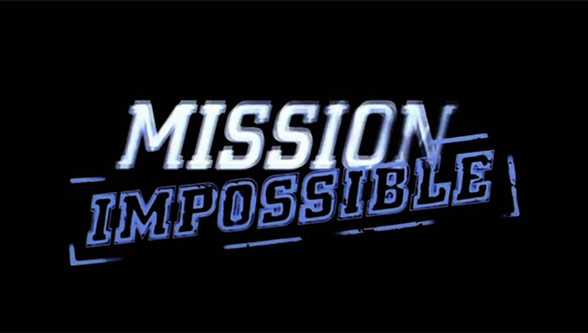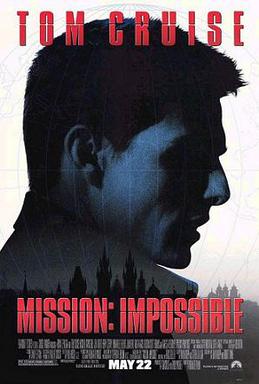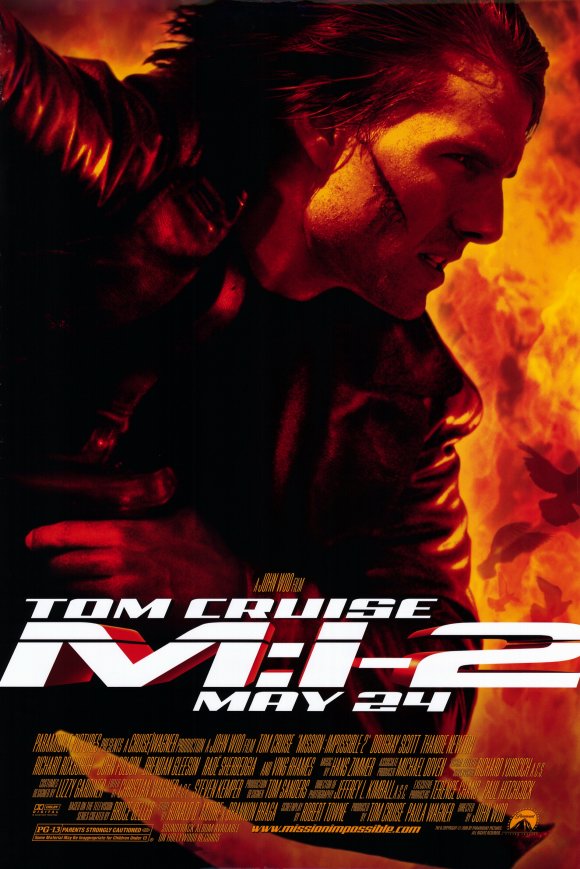
In 1966, writer Bruno Geller created the spy TV series
‘Mission: Impossible’, which revolved around a group of government agents who
took on various missions for the Impossible Missions Force (IMF). The members
of the group changed with each episode with the only full-time leads of the
series being agents Dan Briggs (Steven Hill) and Jim Phelps (Peter Graves), the
latter of whom took over the lead role of the series from Hill after the first
season. The series was a solid success when it first aired on CBS, running for
7 seasons from 1966 to 1973 while also producing numerous iconic bits of pop
culture history from the theme song by Lalo Schifrin to the ‘this tape will
self-destruct in five seconds’ hallmark. In 1988, the series was revived on ABC
with Peter Graves reprising his role of Jim Phelps. However this new iteration
only lasted two seasons primarily due to poor ratings. However, six years
later, the series resurfaced again, this time on the big screen starring Tom
Cruise in the lead role of IMF agent Ethan Hunt. Since then, the ‘Mission
Impossible’ film franchise has been one of the most successful action franchises
of the last two decades, grossing over $2 billion worldwide across four films.
And this is one of those rare franchises that has actually got better as it has
gone on, namely by placing more emphasis on the ‘team’ element that had made
the series so successful in the first place whereas earlier films focused more
on Cruise’s Ethan Hunt character. So today, in preparation for the latest entry
of the series, ‘Rogue Nation’, which hits theaters soon, your Mission, should
you choose to accept it, is to join me as I look back upon the first four films
of the ‘Mission Impossible’ franchise.
MISSION IMPOSSIBLE (1996)

Brian De Palma (‘Scarface’, ‘The Untouchables’) helmed the
first installment of the series in 1996 which, while commercially successful
(it was the third highest-grossing film of the year with $457.7 million
worldwide), was a little more polarizing amongst fans of the show and even some
of the members of the original TV series’ cast such as Greg Morris and Martin
Landau. The primary reason for this was due to the decision to have the series’
main character Jim Phelps serve as the main villain of the film. The fact that
the film also opened with the majority of Ethan Hunt’s team members being
killed off was probably something that fans also had issues with. But overall I
don’t think that these two things are that big of a problem in regards to the
film. While the film obviously strays heavily from the show in terms of the
characterization of Jim Phelps, I thought the whole twist of him being a
traitor was actually handled well enough even though he’s only the ‘main
villain’ during the finale. And while the film did do away with the original
‘team’ in the film’s opening sequence, resulting in the primary focus being on
Ethan Hunt, if anything there’s still enough team-related moments in the film
to at least capture the spirit of the original TV series as much as possible. I
mean at the end of the day, the first ‘Mission Impossible’ at least focused
more on the core IMF team than ‘Mission Impossible II’ did (more on that in a
little bit).
The film’s greatest selling point, though, is its action
sequences. From the scene where Ethan Hunt descends into a CIA vault to recover
a file containing info on all IMF agents to the finale on top of a moving
train, the action sequences in this film are well-shot and edited thanks to De
Palma’s solid direction. As for the writing, many have felt that the plot was a
bit too complicated. Compared to a film like ‘Memento’, I wouldn’t go as far as
say that this film’s plot was ‘that convoluted’ but I do recognize where those
people are coming from as there are some scenes that you do really have to pay
attention because otherwise you’re going to get lost. In short, ‘Mission
Impossible’, despite its major deviations from the original source material, is
still a solid start to this series and for a film that was made nearly 20 years
ago, it still holds up pretty damn well today. Is it the absolute best entry in
the series? No, but like franchises like ‘Harry Potter’, this is just due to
the fact that the series would get better as time went on. Still, the first
‘Mission Impossible’ is still highly recommended as it is easily one of the
best action films of the 90’s if based solely on the action alone. Simply put,
this was the film that proved that Tom Cruise was a premier action star and
that is what continues to define his career to this very day.
Rating: 4/5
MISSION IMPOSSIBLE II (2000)

On paper, ‘Mission Impossible II’ seemed to be another solid
hit for the franchise. In the director’s chair this time was John Woo, who at
the time was known as one of the most prestigious action directors in the world
for his work on films like ‘Hard Boiled’ and ‘Face/Off’. But at the end of the
day, Woo may not have been the best choice to helm a ‘Mission Impossible’ film because
unfortunately, ‘Mission Impossible II’ is the weakest entry of the first four
‘Mission Impossible’ films. The primary reason for this is because this is a
simple case of style over substance. The plot for the film isn’t as convoluted
compared to the first film but this results in the film ending up being a
rather mindless action flick. Now don’t get me wrong, the action sequences are
still as solid as they were in the first film. There’s no denying Woo’s talent
when it comes to directing action. But they ultimately end up lacking depth for
the most part and the main villain Sean Ambrose (Dougray Scott) is a pretty
damn weak villain; Scott’s frequent over-acting doesn’t help much either. Not
only that but Woo’s directing trademarks on are ‘full overload’ here, from his
use of overly symbolic imagery to frequent slow-motion moments and of course,
doves. It may just be because I haven’t really seen any of Woo’s other films before
this but here it’s just a bit too much. For a ‘Mission Impossible’ film, this
feels more like a James Bond film and as much as I am a fan of the James Bond
franchise, that style just isn’t right for the ‘Mission Impossible’ franchise.
This film is also the worst of the series when it comes to
handling the one key component of the franchise; the ‘team’ element. As many
have no doubt already pointed out, this film is pretty much ‘the Tom Cruise
show’ as the film constantly over-glorifies how much of a badass Ethan Hunt is,
which is unnecessary because we already know that Tom Cruise really is a badass
because he does do a lot of his own stunts. Here it just feels like he’s
showing off. If I haven’t mentioned it already, he’s one of the producers of
the franchise but even the other films didn’t over-glorify Cruise as much as
this film does. The overt focus on him results in pretty much everyone else in
the film being downplayed save for Thandie Newton in the role of the female
lead Nyah but even then she’s wasted in an arguably rather sexist role. Sure
Ving Rhames reprises his role of Luther Stickell from the first film but the other
member of the team, pilot Billy Baird (John Polson), is easily one of the most
underdeveloped characters in franchise history and ultimately both Polson and
Rhames are severely underused. In conclusion, I don’t think that ‘Mission
Impossible II’ is a ‘terrible’ film. There are some legitimately good things in
this film though ultimately it’s mostly just the action sequences. The plot is
mindless, Woo’s directorial style goes a bit too overboard, and Tom Cruise
really hogs the spotlight in this entry to the detriment of the other
characters in the film. At the end of the day, ‘Mission Impossible II’ strays
the farthest from the spirit of the original TV series hence why it is
ultimately the worst entry in the series to date. Thankfully there would be nothing
but blue skies for the franchise after this disappointing installment.
Rating: 2/5
MISSION IMPOSSIBLE III (2006)

For ‘Mission Impossible III’, Tom Cruise and his producing
partner Paula Wagner went with a newcomer who would make his feature-length
directorial debut with this film. He would later go on to direct a few films
that you may have heard of, including the upcoming ‘Star Wars: The Force
Awakens’. Yes J.J. Abrams helmed this installment of the franchise and just
like how I feel that he was responsible for resurrecting the ‘Star Trek’
franchise (and I’m confident that he will do the same for ‘Star Wars’), the addition
of Abrams to the franchise (he would go on to produce the next two films in the
series) helped get the ‘Mission Impossible’ films back on track, especially
after the major disappointment that was ‘Mission Impossible II’. Through
Abrams’ stellar direction, this film regains the high-speed pacing and tone
that was lost in its immediate predecessor. And of course, the action sequences
are excellent as always, from the highway attack scene to the raid upon a
building in Shanghai where an object known as the ‘Rabbit’s Foot’ (which for
the record we never actually learn what it is) is located. Something I noticed
about this film in particular was that some of the action sequences are pretty
damn intense or, to quote the MPAA rating for the film, really ‘frenetic’.
While that does mean that the action sequences are much more chaotic than they
are in other ‘Mission Impossible’ films, I do think they do a great job in
really upping the tension. That is especially evident in this film’s cold
opening, which fits the term ‘cold opening’ both figuratively and literally,
resulting in quite frankly one of the best opening sequences that I’ve ever
seen in a film.
This film also does a better job than ‘Mission Impossible
II’ at balancing out the roles of Ethan’s main IMF team. As stated earlier, the
previous film really focused too much on Ethan Hunt and while I can’t say that
these are the most ‘developed’ characters of the franchise, namely as a result
of the film’s action-heavy pacing, the bottom line is that at least the three
other members of Ethan’s team; series regular Ving Rhames and newcomers
Jonathan Rhys Meyers and Maggie Q, aren’t underused like Rhames and John Polson
were in ‘Mission Impossible II’. This film also has the best villain in the
entire series in Owen Davian, played by the late Philip Seymour Hoffman.
Admittedly most of the other ‘Mission Impossible’ villains have been rather
weak, but Hoffman is phenomenal in this film, making Davian such an
intimidating villain especially through his plot to get back at Ethan by
kidnapping his wife Julia (Michelle Monaghan). The addition of Ethan’s wife
also helps bring some solid emotional depth to the film which I feel was sort
of lacking in the last two films, which is pretty ironic given that the second
film focused so much on a love triangle. All in all, I’d say that ‘Mission
Impossible III’ is the first ‘truly great’ entry in the franchise. For the
record that’s nothing against the first ‘Mission Impossible’ film but overall I
just prefer this one over the first as I feel this is where the series really
started to capture the spirit of the original series. Little did any of us know
that things would only get better with the following installment of the
franchise.
Rating: 4.5/5
MISSION IMPOSSIBLE: GHOST PROTOCOL (2011)

Another ‘newcomer’ was chosen to helm ‘Mission Impossible:
Ghost Protocol’ but this wasn’t a case of a ‘newcomer’ who was making his
feature-length debut like J.J. Abrams did with ‘MI3’. Instead, this director
was making his feature-length ‘live-action’ debut having primarily worked on
animated films for the majority of his career. In some ways, that can be
perceived as a risk but ultimately it isn’t when you take into account that the
director is none other than Brad Bird, the genius behind some of the greatest
animated films of all-time like ‘The Iron Giant’ and ‘The Incredibles’… and
this year’s criminally underappreciated ‘Tomorrowland’. Under Bird’s direction,
‘Ghost Protocol’ ends up being the absolute best entry in the entire ‘Mission
Impossible’ series to date. Bird’s talent for visual storytelling translates
perfectly into the film’s amazing action sequences, from the iconic climb up
the Burj Khalifa in Dubai to the subsequent car chase through a sandstorm. And
hopefully a lot of you got the chance to see this in IMAX because these action
sequences are even more amazing on that big-screen. Not only that, but this
film is arguably the best in the entire series when it comes to creating
tension, mostly through said action. Part of this also comes from the main plot
of having Ethan Hunt and his team having to go rogue after a bombing incident
at the Kremlin forces the US government to disavow the entire IMF organization.
Factor in other things like their equipment frequently failing and the tight
pressure that they’re under and you have one of the most suspenseful action
films of the last few years.
But the other great thing about ‘Ghost Protocol’ is that it
is the first in the series to finally perfect the one major element of the
Mission Impossible franchise that some of the films (save for 3) were fairly
lacking in and that is through placing a greater emphasis on the main IMF team
and not being entirely centered on Ethan Hunt. Sure, this is still a Tom Cruise
film and Ethan Hunt is still the main character but this film does a fantastic
job at balancing out the roles of Ethan’s team and giving solid character
development to each of the other members. This includes Benji Dunn (Simon Pegg,
reprising his role from the previous film), who takes on his first major field
mission, Jane Carter (Paula Patton), who during the mission deals with a
personal vendetta against one of their targets, assassin Sabine Moreau (Lea
Seydoux), who was responsible for the death of her teammate/lover Hanaway (Josh
Holloway), and finally ‘analyst’ William Brandt (Jeremy Renner), who is
revealed to have a major connection to Ethan Hunt as he was a former field
agent who feels responsible for the ‘death’ of Ethan’s wife Julia while they
were on vacation on Croatia. Though at the end of the film we learn that this
was all faked and that Julia is still alive, resulting in a touching moment
when Ethan and Julia notice each other from afar. ‘Mission Impossible III’ was
on the right track when it came to having greater emphasis on the other members
of Ethan Hunt’s IMF team but ‘Mission Impossible: Ghost Protocol’ ends up
exceeding that high mark with the series’ best group of leads to date.
I only have one major complaint towards this film and that
is in regards to the main villain, Kurt Hendricks (Michael Nyqvist). Despite a
solid-enough performance by Nyqvist in the role, Hendricks is arguably the
weakest villain in the entire film series. As I stated earlier, Philip Seymour
Hoffman’s Owen Davian has basically been the only ‘great’ villain in the series
and while originally I felt that Sean Ambrose from ‘Mission Impossible II’ was
the weakest in the series, at least he had a presence in that film and a much
more substantial role. Hendricks on the other hand disappears for a sizable
chunk of the film’s run-time, not really doing anything major until the finale.
In fact, pretty much every major ‘adversary’ in the film is only in it for like
a short period of time each. But like how I defend many of the villains of the Marvel
Cinematic Universe for being better than what most critics put them out to be,
here I don’t think it’s that much of an issue because the film does such a
great job in developing the main characters. All in all, ‘Mission Impossible:
Ghost Protocol’ is not only the best film in the entire series up to this point
but it’s also quite frankly one of the best films period of this decade, with
Brad Bird making a fantastic live-action film debut and once again proving why he's one of the absolute best directors currently working today in Hollywood.
Rating: 5/5!
No comments:
Post a Comment